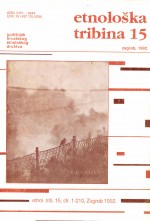Etnologija rata - pisanje bez suza?
Ethnography of War - Writing Without Tears?
Author(s): Maja PovrzanovićSubject(s): Cultural Anthropology / Ethnology, Transformation Period (1990 - 2010), Wars in Jugoslavia
Published by: Hrvatsko etnološko društvo
Keywords: ethnography; war; Croatia; 1991-1992; writing without tears;
Summary/Abstract: Today, numerous theoretical and discursive revaluations of "the hopelessly overlapping, impossibly over-interpreted and conflicted anthropological site" (Said, 1989:211) attack the ethnographic authority. Be the response aesthetic or reductively pragmatic, the problem of reconciling the claims of ideology and desire with the needs of theory and observation, remains underlying the very grounds of all anthropologists' and ethnologists' efforts. The author deals with this problem using the example of her own research project entitled "War and fear - strategies of adaptation", on coping with fear in the war in Croatia 1991/92. She is focusing on several theoretical questions posed by critical American cultural anthropologists (Marcus, Fischer, Clifford and others), in order to consider their relevance for her work, as well as for the work of other ethnologists in a war situation, in which most of the acting options are structurally - institutionally, politically and emotionally - predetermined. These are the questions regarding locating otherness, adequate writing strategies and the personal motives for writing. She argues that for the ethnologist in Croatia 1991/92 it is not possible to write "an ethnography without tears" in the sense of Paul Roth's plea that comprises his critique of confusing literary, epistemological, and political issues in postmodern arguing about ethnographic texts (cf. Roth, 1989). However, epistemological significance cannot be attributed to tears; an explicit and elaborate self-presentation goes without question, but it cannot be the sole legitimization of textual authority. The author claims that the open-ended discourse on postmodern anthropology has to be taken seriously, for exploration and questioning of ethnographic practice in Croatian ethnological tradition seems to be very welcome and long overdue. Although coming from an institutional tradition different from that of European national ethnology, that discourse helps to direct or "discipline" the thinking laden with many fold dilemmas, most of all with the question of the ethnologist's role. Thinking about science as a social process, about the limits of representation and the temporality of our present knowledge, about ethnographic authority, voices and polivocality, about politics, rhetoric and power, about partial truths and true fictions (cf. Clifford, 1986), helps in rethinking the ethnologist's position, interests and search for theory, i.e. for possibilities of inventing certain models of cultural processes in the chaos of war. Above all, the postmodern discussion demands a consistent, morally sensitive thinking about what it means to take a position, as well as a confrontation with the ambiguity, illusory stability, and vulnerability of an ethnographer's vantage point (cf. Crapanzano 1990) - the issues so painfully important for ethnologists in Croatia 1991/92.
Journal: Etnološka tribina : Godišnjak Hrvatskog etnološkog društva
- Issue Year: 22/1992
- Issue No: 15
- Page Range: 61-80
- Page Count: 20
- Language: Croatian

